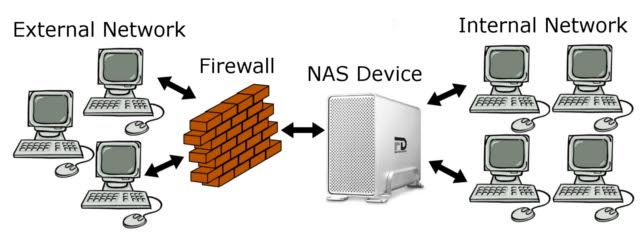Network Attached Storage
From Computing and Software Wiki
Network Attached Storage (NAS) provides a network connected central location for data storage, as opposed to distributing data storage responsibilities among the various clients of the network.
Contents |
History
Computing data files have always been stored locally on workstations and personal computers because slow transfer speeds made remote data inconvenient to access. Recent improvements to data transfer speeds and the proliferation of broadband connections have allowed for the centralized storage of data for an entire internal network. Network Attached Storage (NAS) came into existence as a computing device with large capacity non-volatile storage that was connected to the network using the Internet Protocol (IP). It provided a storage location for large files that were cumbersome to store and process on Personal Computers in both workplace and residential applications. Data transfer speeds for early NAS devices depended heavily on the CPU and RAM speeds of the internal computer. However, in recent years many NAS devices have adopted the iSCSI network protocol for data transfer, greatly reducing the processing and memory needed for common tasks.
Uses
NAS Devices have many potential applications. Some example applications include:
- Storing large data sets for open exchange at academic institutions
- Providing household access to personal digital photos, music, documents, and videos
- Streaming multimedia content using the DNLA file sharing protocol
- Protecting an organization's critical data from loss through redundant devices or internal mechanisms
- Allowing an internal network to share data freely while protecting its integrity via a firewall
Commercial Options
Lorem ipsum dolor sit amet, consectetur adipisicing elit, sed do eiusmod tempor incididunt ut labore et dolore magna aliqua. Ut enim ad minim veniam, quis nostrud exercitation ullamco laboris nisi ut aliquip ex ea commodo consequat. Duis aute irure dolor in reprehenderit in voluptate velit esse cillum dolore eu fugiat nulla pariatur. Excepteur sint occaecat cupidatat non proident, sunt in culpa qui officia deserunt mollit anim id est laborum.
Residential Options
Lorem ipsum dolor sit amet, consectetur adipisicing elit, sed do eiusmod tempor incididunt ut labore et dolore magna aliqua. Ut enim ad minim veniam, quis nostrud exercitation ullamco laboris nisi ut aliquip ex ea commodo consequat. Duis aute irure dolor in reprehenderit in voluptate velit esse cillum dolore eu fugiat nulla pariatur. Excepteur sint occaecat cupidatat non proident, sunt in culpa qui officia deserunt mollit anim id est laborum.
References
- Storage Evolution: NAS and SANs Coming Together, Ben Freeman, Enterprise Storage Forum Featured Article, March 2004, http://www.enterprisestorageforum.com/sans/features/article.php/3330701
- Network-attached storage - a cheaper, easier option for small businesses, Bill O'Brien, ITBusiness.ca Featured Article, January 2009, http://www.itbusiness.ca/it/client/en/home/news.asp?id=51838
- Top 10 Network-Attached Storage Devices, Melissa J. Perenson, PC World, March 2009, http://www.pcworld.com/article/125072/top_10_networkattached_storage_devices.html
- NEF Design, Inc., Network Attached Storage Diagram, http://www.nefdesign.com/Thecus/4100_Diagram.jpg
See Also
Statistics of Internet Threats
Statistics of Internet Threats
External Links
--Holtomm 21:05, 12 April 2009 (EDT)

